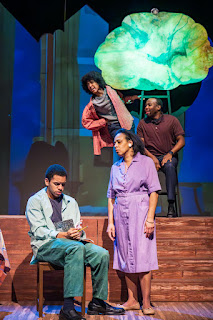Several years in the making, the new play
Diesel Heart is now on stage at History Theatre. Adapted from the
autobiography of the same name by Melvin Carter, Jr., one of St. Paul's first Black police officers (and father of
the current mayor), this is a story of the history of America. Specifically, the migration of Black Americans from the rural South to Northern cities (like Minneapolis and St. Paul), the displacement of Black communities through the building of interstate freeways (see also
History Theatre's 2017 play The Highwaymen), the violence faced by many Black men and women growing up in this country, and the perseverance through those hardships into a better future. Melvin Carter, Jr. is an ordinary and extraordinary man living an ordinary and extraordinary life, that's beautifully brought to life on stage by the talented cast and creative team.
See it at the History Theatre in downtown St. Paul now through April 2.
It's a challenge to fit 40 years of a life into a two-hour play, but playwright Brian Grandison does an admirable job. We don't spend too long in any phase of Melvin's life, but through it all we get the picture of a man. The play begins at a pivotal moment during his service in the Navy, and then we flash back to his life as a boy growing up in St. Paul's Rondo neighborhood in a large and loving, but strict, family. When I94 was built right through the heart of Rondo, the Carter family was forced to move from the home that his great-uncles bought when they first moved North in the early 20th Century, escaping danger in the South. We follow Melvin through his troubled teen years (fighting and getting into scrapes) and back to that pivotal moment in the Navy, then forward into his decision to join the St. Paul police force (after they were forced to hire more Black officers after a 1972 lawsuit), his marriage and children, and the founding of the organization Save Our Sons. It's a story of courage, perseverance, and a life lived in service to others.
 |
Calvin Zimmerman as young Melvin with
the ensemble (photo by Rick Spaulding) |
Two excellent actors portray the lead character - young Calvin Zimmerman as the child and teenager, and Mikell Sapp as the adult version. Sometimes both are on stage at once, Mikell as the older Melvin narrating his life and watching his young self. Both performances endear us to Melvin, always showing the heart and humanity behind the sometimes questionable decisions. Everyone in large and talented cast plays multiple characters, sometimes almost unrecognizable from one to the next. Of particular note are Ron Collier and Monica E. Scott as Melvin's parents, both portraying the tough love of parents who want their children to succeed in a world that's stacked against them. Director Warren C. Bowles keeps the story flowing from one anecdote to the next, with memorable performances from ensemble members Pearce Bunting, Peyton Dixon, Darius Dotch, Camrin King, Eric Knutson, and Ninchai Nok-Chiclana.
 |
| Mikell Sapp as Melvin with the ensemble (photo by Rick Spaulding) |
Seitu Jones' sparse set design employs a rotating platform with set pieces hidden in secret doors and drawers, all in a warm wood grain. On top of the circular platform is a mini steel tower with an emblem on top - either a tree to represent the neighborhood, or the Navy base insignia, or the titular heart. Projections of colorful illustrations (designed by Kathy Maxwell) help set the scene. Joe Burch's versatile costumes take us through the decades, and fight choreographer Annie Enneking has created a number of realistic and entertaining fight scenes.
I was lucky enough to attend the show on a day when they had a talkback with the cast, creative team, and the man himself. Mr. Carter is obviously a great storyteller and a jokester, and the play captures that spirit. He's a humble man, saying he just tried to be the best version of himself that he could be, but also aware that his story represents a larger story, that of the history of America, and particularly Black Americans, in the 20th Century. A version of the American Dream in a country that doesn't hand that dream equally to all its citizens, yet he succeeded nonetheless. As noted in the talkback, he and his wife Toni (former Ramsey County Commissioner, the first Black female commissioner in the state) raised a mayor - what's better than that? A mayor that's a descendent of the thriving Black community called Rondo that was disrupted but not destroyed by the construction of a freeway, and lives on in ordinary and extraordinary families like the Carters.
See Diesel Heart at the History Theatre in downtown St. Paul now through April 2.



